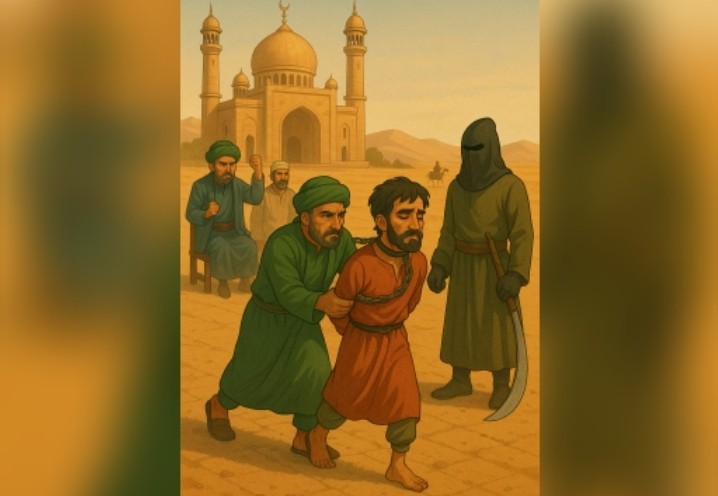
At that time, the city of Madinah was under a peaceful rule. Caliph Hazrat Umar (Radiyallahu Ta’ala Anhu), though strict, was known among all as a just ruler.
One morning, while he was busy with his work, two young men suddenly came to his court and said,
— “O Ameerul Mu’mineen, our father has been killed. We have brought the killer. We want justice!”
Everyone looked on in shock. Hazrat Umar (RA) asked the young man,
— “Do you admit this accusation?”
The young man lowered his head and said,
— “Yes, I admit it.”
Then Hazrat Umar (RA) told the young man, “Tell me what happened.”
The young man began to speak: “I was on my way to my destination this morning. I was very tired. I saw a date garden and lay down beside it. After being very tired, I fell asleep. When I woke up, I suddenly found my horse was gone! I searched everywhere and entered the old man’s date garden.
Inside the garden, I saw my horse lying dead. I was burning with grief and anger. I asked the old man,
— ‘Who killed my horse?’
He angrily replied,
— ‘Your horse entered my garden and was damaging the trees, so out of anger I threw a stone at it and it died.’
Hearing this, I was overwhelmed with rage. During the heated exchange, I threw a stone — only intending to scare him. But it hit his chest directly. He fell down, and unfortunately, he died.”
Hearing the incident, the whole court fell silent. Hazrat Umar (RA) looked at the two brothers and asked,
— “Do you want to forgive him?”
They replied,
— “No! Just as the killer took our father’s life, he should be punished the same way!”
Hazrat Umar (RA) then said,
— “Then this young man is sentenced to death.”
Hazrat Umar (RA) asked the young man, “What is your last wish?”
The young man pleaded,
— “I have entrusted items from people. I have some wealth kept for my younger brother. If I get three days’ time, I can go and return everything.”
Umar (RA) said, “You are a stranger. We cannot let you go, unless someone stands as a guarantor for you.
But remember, if you don’t return in three days, the person who becomes your guarantor will be given the death penalty in your place.”
The young man said, “Sir, I have no one here. Everyone is a stranger to me. Who would I ask to be my guarantor? No one would agree.”
No one said anything. Suddenly a man named Abdullah stood up — he said, “I will be his guarantor.”
Three days passed.
There was no sign of the young man.
So, just before the time of execution, the court gathered again. Everyone said — “The young man is not coming back. Abdullah will be given the death sentence!”
The executioner was ready. Everything was prepared. Abdullah — he too was ready. Just at the moment when the sentence was about to be carried out, a dust cloud appeared from the desert. The companions said, “Wait, it seems the young man is returning.” Within moments, the young man came running! He told the Caliph, “Sir, if my horse had not been sick, I would have returned on time. I am asking everyone for forgiveness for this delay.”
Seeing the young man return, Umar (RA) asked,
— “Why did you come back?”
The young man replied,
— “Sir, I returned so that no one can say in the future that a Muslim died because another Muslim stood as his guarantor during his time of distress.”
Then Umar (RA) asked Abdullah, “Why did you become the guarantor?” Abdullah said, “So that no one in the future can say that a distressed Muslim, despite having many Muslims around him, did not find even one person to help him.”
Hearing these two men, the two brothers who brought the complaint began to cry and told Hazrat Umar (RA), “Sir, since the young man did not intentionally kill our father, and the way he returned and how Abdullah stood by him — we no longer want to punish him. We want to forgive him.”
🌟 Moral Lessons:
- The power of truth is greater than anything.
- Honest character can save even a stranger’s life.
- Forgiveness, patience, and justice are the true beauties of Islam.